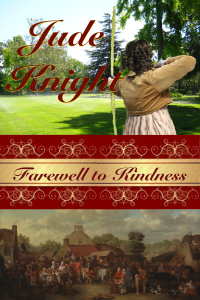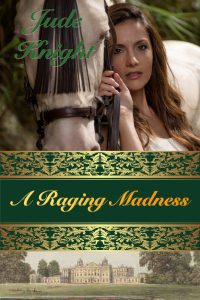Jude Knight's Blog, page 159
November 21, 2014
Candle’s Christmas Chair – in which our hero and heroine meet after 3 years
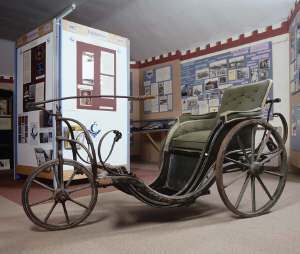 First few 100 words from WIP – a short story I want to give away for Christmas.
First few 100 words from WIP – a short story I want to give away for Christmas.
‘”Tha’ wants to talk to Min about they chairs,” said the man in the office, and directed Candle Avery to the far corner of the carriage-maker’s yard.
Candle strode through the light rain, dodging or leaping the worst of the mud and puddles. Min. Short for Benjamin, perhaps? Or Dominic?
No, he concluded, as his eyes adjusted to the light inside the shed. The delightful posterior presented to his eyes belonged to neither a Benjamin nor a Dominic. The overalls were masculine, but the curves they covered were not.
She was on a ladder, leaning so far into a bank of shelves that lined the wall opposite the door that her upper half was hidden, but he had no objection to the current view–said delightful posterior at his eye level and neatly outlined as she stretched, a pair of trim ankles showing between the top of her sensible half boots and the hems of the overalls.
“Botheration.” Whatever she was reaching for up there, it was not obliging her by coming to her hand. Perhaps his lofty height might be of service?
“May I help, Ma’am?” he asked.
There was a crash as she jerked upright at the sound of his voice, and hit her head on the shelf above. As she flinched backward from the collision, the ladder tipped sideways, spilling its occupant into Candle’s hastily outstretched arms.
The curves were everything he thought, and the face lived up to them. A Venus in miniature, black curls spilling from the kerchief that held them away from the heart-shaped face, that quintessentially English complexion known as peaches and cream, grey eyes fringed with dark lashes.
Grey eyes that had haunted his dreams for three long years, ever since she had bedazzled him at a house party for the amusement of her friends, and then left without saying goodbye.
Grey eyes that turned stormy as he held her a moment too long. He hastily set her down.
“Miss Bradshaw.”
“Captain Avery. No, it is Lord Avery, now, is it not? My condolences on the death of your father.
He bowed his acknowledgement, his mind racing. Bradshaw Carriages. He hadn’t made the connection. Had he known when he was courting her that she was a carriage-maker’s daughter? He didn’t remember anyone mentioning it.
But he did remember that her friends called her Minnie. Miss Minnie Bradshaw. Min.
#*#
Lord Avery was broader than she remembered. He’d been little more than a boy at that horrid house party, but even then the tallest man she had ever met. Isolated and nervous in that crowd of scheming cats who only invited her to humiliate her, she’d believed him when he claimed to care.
With him at her side, she’d braved the crush at the ball. Short as she was, she usually found such occasions overwhelming. People looked over her, bumped into her, ignored her. But Lord Avery – Captain Avery he’d been then – kept her safe. She’d even, for the first time in her life, been enjoying herself at a ball. Right up until she overheard his best friend explaining that Avery despised her common origins and was only courting her for her money.
That had been Min’s last venture into the aristocratic world her parents had educated her for. She’d come home to Bath, and told her mother that she would marry, if marry she ever did, in her own class. But none of her suitors had ever measured up to the tall red-headed guards officer who even now, standing here in her workshop, turned her knees to jelly.
What was he doing in her workshop? Why would he tracked her down?
“Can I help you, Lord Avery?” She couldn’t do much about the colour that pinked her cheeks, or the way her heart pounded. But she could, and did, keep her voice level and and her tone cool.
He was immediately all business. “I am after a chair, Miss Bradshaw. It is still Miss Bradshaw?”
She nodded, seething. How dare he comment on her marital status. She wanted to tell him that she’d refused five proposals in the last three years. But he was continuing: “The Master at the Pump Rooms told me that Bradshaw’s makes the best chairs in Bath, and the man in the office sent me here.”
“I see. And what sort of a chair do you require?”
His brows drew together. “An invalid’s chair. That is what you make, is it not? What your father makes, I mean?”
He might as well know the whole of it. She was not ashamed. And if his eyes turned cold and scornful, what was that to her? She was, no doubt, just imagining the warmth she saw. As she had imagined his admiration so long ago.
“You were right the first time, Lord Avery. I design the chairs. And I make each prototype for my assistants to copy.”
“I say,” he said, “good for you!” And he smiled at her. She remembered those smiles. And, though her mind knew he couldn’t be trusted, her foolish heart didn’t believe her.
Excerpt 2 posted on 25 November.



Candle’s Christmas Chair
 First few 100 words from WIP – a short story I want to give away for Christmas.
First few 100 words from WIP – a short story I want to give away for Christmas.
‘”Tha’ wants to talk to Min about they chairs,” said the man in the office, and directed Candle Avery to the far corner of the carriage-maker’s yard.
Candle strode through the light rain, dodging or leaping the worst of the mud and puddles. Min. Short for Benjamin, perhaps? Or Dominic?
No, he concluded, as his eyes adjusted to the light inside the shed. The delightful posterior presented to his eyes belonged to neither a Benjamin nor a Dominic. The overalls were masculine, but the curves they covered were not.
She was on a ladder, leaning so far into a bank of shelves that lined the wall opposite the door that her upper half was hidden, but he had no objection to the current view–said delightful posterior at his eye level and neatly outlined as she stretched, a pair of trim ankles showing between the top of her sensible half boots and the hems of the overalls.
“Botheration.” Whatever she was reaching for up there, it was not obliging her by coming to her hand. Perhaps his lofty height might be of service?
“May I help, Ma’am?” he asked.
There was a crash as she jerked upright at the sound of his voice, and hit her head on the shelf above. As she flinched backward from the collision, the ladder tipped sideways, spilling its occupant into Candle’s hastily outstretched arms.
The curves were everything he thought, and the face lived up to them. A Venus in miniature, black curls spilling from the kerchief that held them away from the heart-shaped face, that quintessentially English complexion known as peaches and cream, grey eyes fringed with dark lashes.
Grey eyes that had haunted his dreams for three long years, ever since she had bedazzled him at a house party for the amusement of her friends, and then left without saying goodbye.
Grey eyes that turned stormy as he held her a moment too long. He hastily set her down.
“Miss Bradshaw.”
“Captain Avery. No, it is Lord Avery, now, is it not? My condolences on the death of your father.
He bowed his acknowledgement, his mind racing. Bradshaw Carriages. He hadn’t made the connection. Had he known when he was courting her that she was a carriage-maker’s daughter? He didn’t remember anyone mentioning it.
But he did remember that her friends called her Minnie. Miss Minnie Bradshaw. Min.
#*#
Lord Avery was broader than she remembered. He’d been little more than a boy at that horrid house party, but even then the tallest man she had ever met. Isolated and nervous in that crowd of scheming cats who only invited her to humiliate her, she’d believed him when he claimed to care.
With him at her side, she’d braved the crush at the ball. Short as she was, she usually found such occasions overwhelming. People looked over her, bumped into her, ignored her. But Lord Avery – Captain Avery he’d been then – kept her safe. She’d even, for the first time in her life, been enjoying herself at a ball. Right up until she overheard his best friend explaining that Avery despised her common origins and was only courting her for her money.
That had been Min’s last venture into the aristocratic world her parents had educated her for. She’d come home to Bath, and told her mother that she would marry, if marry she ever did, in her own class. But none of her suitors had ever measured up to the tall red-headed guards officer who even now, standing here in her workshop, turned her knees to jelly.
What was he doing in her workshop? Why would he tracked her down?
“Can I help you, Lord Avery?” She couldn’t do much about the colour that pinked her cheeks, or the way her heart pounded. But she could, and did, keep her voice level and and her tone cool.
He was immediately all business. “I am after a chair, Miss Bradshaw. It is still Miss Bradshaw?”
She nodded, seething. How dare he comment on her marital status. She wanted to tell him that she’d refused five proposals in the last three years. But he was continuing: “The Master at the Pump Rooms told me that Bradshaw’s makes the best chairs in Bath, and the man in the office sent me here.”
“I see. And what sort of a chair do you require?”
His brows drew together. “An invalid’s chair. That is what you make, is it not? What your father makes, I mean?”
He might as well know the whole of it. She was not ashamed. And if his eyes turned cold and scornful, what was that to her? She was, no doubt, just imagining the warmth she saw. As she had imagined his admiration so long ago.
“You were right the first time, Lord Avery. I design the chairs. And I make each prototype for my assistants to copy.”
“I say,” he said, “good for you!” And he smiled at her. She remembered those smiles. And, though her mind knew he couldn’t be trusted, her foolish heart didn’t believe her.



November 20, 2014
The happy endings myth
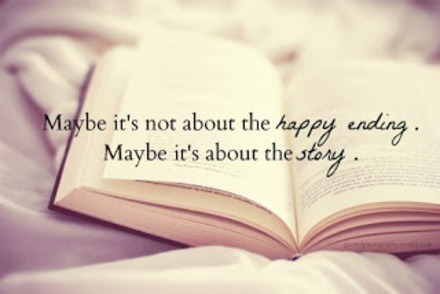 One of the criticisms I’ve heard of romance novels is that they have happy endings, and ‘happy endings are not realistic’.
One of the criticisms I’ve heard of romance novels is that they have happy endings, and ‘happy endings are not realistic’.
The critics are, of course, quite right. Happy endings do not happen in reality. And neither do sad endings. In fact, endings of any kind are a totally artificial construct. My personal story didn’t begin with my conception; my conception was simply an event in the story of my parents, and my story is an integral part of that. Nor will it end at my death. What I’ve made (children, garden, quilts, books) will carry on after me.
Whenever we write and whatever we write, we impose an artificial structure on reality. We choose a point and call that the beginning. And we choose another point and call that the end.
In the continuing story that was the life of my fictional character Stephen Redepenning, I could have chosen a different place to start and to stop. I could, perhaps, have started with the intrepid young adventurer boarding a ship for Canada. I could have followed with the adventure of his life as he found a place in the wilderness, entered into a trade agreement with locals that he sealed by marrying one of their daughters, and built his own small fur trapping empire. I could have ended as he stood in the smoking ruins of his log cabin, looking at the graves of his wife and children and swearing vengeance on their murderers.
It might have been a good story. But it isn’t the part of his life that I chose to tell.
I like stories that end on an upward trajectory, not a downward trajectory. If I like the protagonists, I want them to have hope. I want to feel that they have a chance for a happy future. To me, the end of the story is more about the writer giving me food for what happens next. In my imagination, the story continues.
(And, if I don’t like the protagonists, I have no objection to someone else in the story having the happy ending. Hamlet’s tragedy turned out rather well for Fortinbras.)
The romance novel’s ‘happily ever after’ is not about perfect resolution of all problems; it’s about convincing the reader that the protagonists will support each other through whatever problems arise. Romeo and Juliet was always going to be a tragedy, not because the lovers died, but because of the type of character that Romeo was. If they’d lived, he would have been on to the next hot chick within a month or two.
But Bassanio and Portia, in the Merchant of Venice, face trials together and win through, and we’re confident that they’ll be able to continue to do so.
I met my PRH at a prayer meeting nearly 46 years ago. Our lives together have hit rough patches here and there, with internal and external trials. But facing them as a couple has made us stronger. Whatever happens in the years left to us, we’ll cope. Now that’s a happy ending.



November 19, 2014
Candle’s Christmas Chair
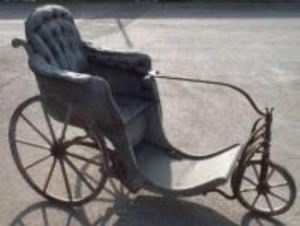 In Farewell to Kindness, Lord and Lady Avery are at the assembly where Alex comes a cropper in his Bath chair. Lady Avery rushes up to inspect the pieces. It transpires that she was the chair’s designer.
In Farewell to Kindness, Lord and Lady Avery are at the assembly where Alex comes a cropper in his Bath chair. Lady Avery rushes up to inspect the pieces. It transpires that she was the chair’s designer.
How, I wondered, did Viscount Avery come to marry Minerva Bradshaw, Bath chair designer and daughter of a Bath carriage maker?
Candle’s Christmas Chair is the result. I have my plot outline, and one and a half character sketches. I should begin writing this weekend.
I plan it as a short story or novella. If I can stick to the plan, it’ll be out for Christmas (just). Five weeks? We’ll see.



November 18, 2014
Yikes
November 17, 2014
When you break eggs, make omelettes
I’ve set myself a challenge in the epilogue of Farewell to Kindness. My secondary character David, who is hero of the book I plan to write next, is reported to be missing. No-one has heard from him for four months.
I don’t know where that came from. It was in the plan to send him searching for his heroine, known in Farewell to Kindness as Mist. But four months? Where did she go? Where did he go? What is holding them up and why? I have absolutely no idea. And I don’t know how the answers are going to affect the already plotted chapter outline of Encouraging Prudence.
I started Farewell to Kindness thinking I was a planner. And I am. But the bits of the book that excite me most are the ones that came out of nowhere and insisted on changing all of my carefully structured plans. My main villain turned out to be someone quite different to who I intended, the book ended a month earlier than intended and in a different locale, and several characters that weren’t even in the first draft demanded their own place in the 3rd.
I’m tentatively learning to trust my subconscious. When I find I’ve dropped a whole heap of eggs all over my plot, I’m learning to give a cheer and enjoy the ensuing omelette.
I came across this article by Juliet Marillier that talks about characters taking over . What she says rings true to me:
. What she says rings true to me:
So here I am, getting to the pointy end of this manuscript with my characters in increasing peril from external sources and at the same time beset by internal conflict (there’s a strong thread in the Shadowfell books about conscience and responsibility – can lies, deception and violence be justified if they’re the only way to achieve a greater good?) I know already that my two protagonists can’t come out of the story without significant psychological damage. And now one of those protagonists has started making choices I didn’t plan for him. Awful choices. Crazy, unwise choices. What’s going on?
I find while I’m writing the last part of a book, the part where I ratchet up the tension and present my characters with impossible choices, I sleep fitfully, dream vividly, and think about the story and characters most of the time, often to the detriment of whatever else I’m supposed to be doing. I get a lot of ‘brain churn’, a not-especially-helpful overload of story details bubbling around in my mind. I become quite disturbed when my characters have to face terrifying situations or sink into a mass of dark thoughts. Perhaps that’s because their stories, though fictional and including fantasy elements, are not so different from the situations some people still face in our world, in places where tyrannical regimes use terror as a tool of control. Or perhaps it’s because my protagonists feel like real people to me, and I, the author/God of this creation, have chosen to subject them to hell on earth. Now one of them is challenging me in a way that makes me uncomfortable.Go on, push me. Push me to the edge. See how much more I can take before I jump.
Characters don’t exist independently, of course, however real they may become to us. They are indeed all in our minds. If another writer came to me for advice on the situation outlined above, I’d say keep writing, let the character have his head, finish the novel, then go back and rewrite that section if you’re not happy with it. If a character seems to be pushing or pulling hard, chances are that’s the natural direction for the story to take. If the guy is in your head all the time, urging you on, what you write may well be inspired.



November 16, 2014
Getting rid of filter words

Image is from: http://inkslingereditorialservices.co...
‘Show. Don’t tell.’ Every writer has heard this mantra. I hadn’t, though, heard of filter words till recently. Filter words are verbs that take the reader one step away from experiencing life as your POV character. Leah Wohl-Pollack of Invisible Ink Editing gives this list:
to see
to hear
to think
to touch
to wonder
to realize
to watch
to look
to seem
to feel (or feel like)
can/could/couldn’t
to decide
to know
to sound like
to notice
to be able to
to note
to experience
to remember
I’ve been through my draft evaluating each filter word as I find it. Here’s one passage before the changes:
She felt torn between railing at him for his arrogance and blurting out how uncomfortable she was with the constant prickly awareness he induced in her. Silence seemed safe. She said nothing as he coaxed the horses onto the bridge, then turned to pass the mill.
This became:
Should she rail at him for his arrogance? Blurt out how uncomfortable he made her? She was constantly aware of him; every nerve ending on edge and a strange hollow warmth in the pit of her stomach. Silence seemed safer. She kept her eyes turned away from on his strong hands as he coaxed the horses onto the bridge, then turned to pass the mill.
It’s a great tip. For more, just google ‘filter words’.



November 14, 2014
The end
 So that’s it. 3rd draft finished. A little tidying to do, and I’ll be ready for the Beta Readers (thanks, all). Here’s the updated excerpt.
So that’s it. 3rd draft finished. A little tidying to do, and I’ll be ready for the Beta Readers (thanks, all). Here’s the updated excerpt.



Why do I need a beta reader?
 The third draft of Farewell to Kindness will be finished this weekend; probably later today. Some wonderful people have volunteered to read it for me, and I’ve been fishing around for clues on what I should say when I brief them. I found a fabulous resource by Belinda Polland at Small Blue Dog Publishing. It explains what a beta reader is, and why we need one. It then goes on to link to more articles about how to find beta readers and how to brief them. Great stuff. Here’s Belinda’s list of reasons:
The third draft of Farewell to Kindness will be finished this weekend; probably later today. Some wonderful people have volunteered to read it for me, and I’ve been fishing around for clues on what I should say when I brief them. I found a fabulous resource by Belinda Polland at Small Blue Dog Publishing. It explains what a beta reader is, and why we need one. It then goes on to link to more articles about how to find beta readers and how to brief them. Great stuff. Here’s Belinda’s list of reasons:
The fact is, we spend so much time on our own manuscripts that we can’t see them objectively — no matter how diligently we self-edit. These can be some of the outcomes (there are plenty more):
We create anticipation or an expectation early in the book, but forget to deliver on it.
We describe events in a way that is clear to us but not clear to a reader who can’t see the pictures in our head. (At least, we hope they can’t see them. Are you looking inside my head??? Eek!)
We leave out vital steps in an explanation and don’t realise it, because we know what we mean.
The characters in our books (whether fictional, or real as in a memoir or non-fiction anecdote) are not convincing, because we know them so well we don’t realise we haven’t developed them thoroughly on paper.



November 13, 2014
#amediting 3
I’m in the final pages of the third draft of Farewell to Kindness. From this point on, almost every row in my plot-line spreadsheet has notes in the ‘needs work’ column. I’ve been averaging 35 pages an hour (the train trip to and from work takes an hour, so it’s easy to work out), but today’s output was six pages. Still, I have another trip tonight, and then the weekend.
Next, I do a final check for filter words and egregious spelling errors, and format it for the beta readers.
I have a whole lot of super people who have volunteered to read the novel and tell me what they think. I’m pretty nervous, but very excited.
While it’s with the beta readers, I plan to leave it alone, apart from writing the artistic brief for the cover and book trailer.
Oh, yes, and rewriting the book blurb on this site and on Goodreads.
I don’t expect any of those to take long, and I’ll mainly be focusing on the next writing projects.
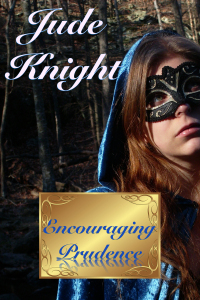 I want to write Candle’s Christmas Chair (a short story or novella, depending on how much I write, that I want to have ready to give away for Christmas). And, if I’m to have the first chapters in the back of Farewell to Kindness, I need to finish the chapter outlines and main character sketches for Encouraging Prudence and A Raging Madness.
I want to write Candle’s Christmas Chair (a short story or novella, depending on how much I write, that I want to have ready to give away for Christmas). And, if I’m to have the first chapters in the back of Farewell to Kindness, I need to finish the chapter outlines and main character sketches for Encouraging Prudence and A Raging Madness.
So no boredom on the horizon yet, then.
In January, I plan to do any changes that come out of the beta read, then read the whole book aloud into a recording App on my iPad. This will let me be my own reader/listener for a complete copy edit, which can be my train-time project for January. I’ll send it for a professional proofread once I’ve done my own copy edit. And then whole heap more jobs to actually publish. I’ve got a little list. (But, if you’ve been reading my blog, you will have guessed that.)




